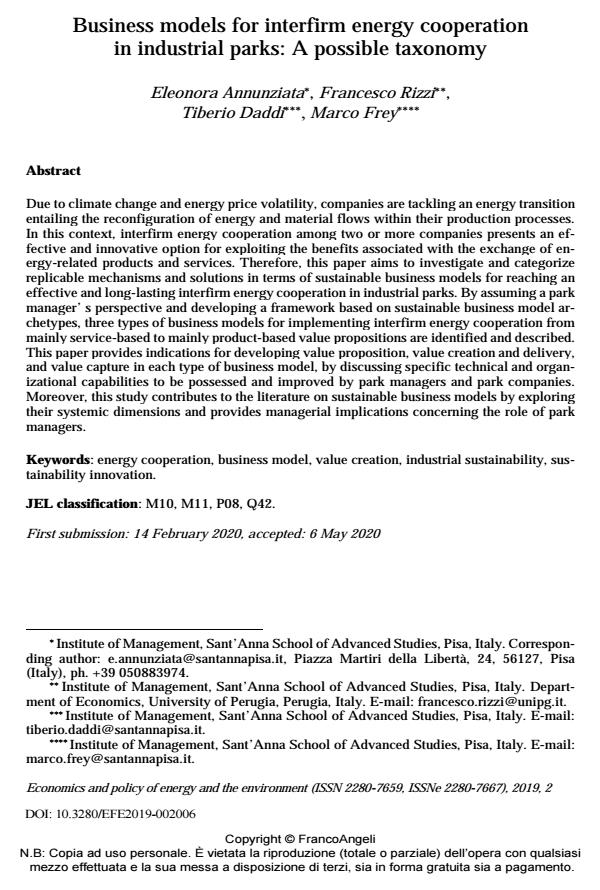Business models for interfirm energy cooperation in industrial parks: A possible taxonomy
Titolo Rivista ECONOMICS AND POLICY OF ENERGY AND THE ENVIRONMENT
Autori/Curatori Eleonora Annunziata, Francesco Rizzi, Tiberio Daddi, Marco Frey
Anno di pubblicazione 2020 Fascicolo 2019/2
Lingua Inglese Numero pagine 16 P. 133-148 Dimensione file 125 KB
DOI 10.3280/EFE2019-002006
Il DOI è il codice a barre della proprietà intellettuale: per saperne di più
clicca qui
Qui sotto puoi vedere in anteprima la prima pagina di questo articolo.
Se questo articolo ti interessa, lo puoi acquistare (e scaricare in formato pdf) seguendo le facili indicazioni per acquistare il download credit. Acquista Download Credits per scaricare questo Articolo in formato PDF

FrancoAngeli è membro della Publishers International Linking Association, Inc (PILA), associazione indipendente e non profit per facilitare (attraverso i servizi tecnologici implementati da CrossRef.org) l’accesso degli studiosi ai contenuti digitali nelle pubblicazioni professionali e scientifiche.
Due to climate change and energy price volatility, companies are tackling an energy transition entailing the reconfiguration of energy and material flows within their production processes. In this context, interfirm energy cooperation among two or more companies presents an effective and innovative option for exploiting the benefits associated with the exchange of energy- related products and services. Therefore, this paper aims to investigate and categorize replicable mechanisms and solutions in terms of sustainable business models for reaching an effective and long-lasting interfirm energy cooperation in industrial parks. By assuming a park manager’ s perspective and developing a framework based on sustainable business model archetypes, three types of business models for implementing interfirm energy cooperation from mainly service-based to mainly product-based value propositions are identified and described. This paper provides indications for developing value proposition, value creation and delivery, and value capture in each type of business model, by discussing specific technical and organizational capabilities to be possessed and improved by park managers and park companies. Moreover, this study contributes to the literature on sustainable business models by exploring their systemic dimensions and provides managerial implications concerning the role of park managers.
Parole chiave:Energy cooperation, business model, value creation, industrial sustainability, sustainability innovation.
Jel codes:M10, M11, P08, Q42.
Eleonora Annunziata, Francesco Rizzi, Tiberio Daddi, Marco Frey, Business models for interfirm energy cooperation in industrial parks: A possible taxonomy in "ECONOMICS AND POLICY OF ENERGY AND THE ENVIRONMENT" 2/2019, pp 133-148, DOI: 10.3280/EFE2019-002006